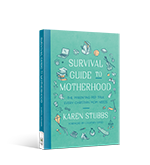
Sign Up for Updates
Connect
TOPICS
- Latest Blog
- Fiction
- Inspirational/Devotional
- Men's Christian Living
- Prophecy
- Women's Christian Living
- View All
ARCHIVES
Why Is it Important to Help our Kids Learn About Their Feelings?
Posted on Apr 27, 2023 Topic : Men's Christian Living, Women's Christian Living
Posted by : Katie Kenny Phillips

My 10-year-old daughter was having a particularly rough morning the other day. Mornings just seem to be tough, in general (am I right, mamas?!), but she was grumpier than usual. I found myself getting really irritated. Why do mornings have to be so ugly? Why can’t she recognize that she is being unkind to me when all I’m trying to do is help her?
That’s when I realized there was something else going on. I remembered she had a test scheduled for that day and was very, very nervous. Of course, she wasn’t saying, “Mother, I’m so sorry I’m being particularly crabby with you this morning but I’m anxious about a timed test this morning and I have very high expectations for myself. I don’t want to let you, my teachers, or myself down by doing poorly.” Nope. It came out more like, “MOOOOOOOOOOOOOM. STOOOOOP IT!” I think she may have even said I was being “cringe.”
It was helpful to figure out what was going on underneath the surface, so we could start to deal with it. I was able to encourage her that I thought her test was going to go well. I told her all we asked of her is that she try her best. I told her I’d be praying for her throughout the day to stay calm and remember everything she had studied. As our little ones start to learn to communicate, we want them to start learning about their feelings. We want them to be able to stop lashing out at other people and think, wow, I’m really nervous about my test and I’d like some reassurance that everything is going to be ok.
***
So, what are some of the big reasons why it’s important for kids to learn and grow in their social-emotional learning? And what are some ways we can help them?
It’s Important That Children Learn to Dive Deeper Than Just Mad and Happy
When kids are babies, it seems as if they operate between happy and furious. There's no in-between. Feed them, cuddle them, change their diapers, allow them the rest they need. This equals a happy baby (most of the time.) But if you are one nanosecond late with any of the above actions, that equals a furious baby. As kids get older, however, it makes sense to start identifying a few of their other emotions and labeling them.
For example, when we need our toddler to get ready to walk out the door, they most likely will be angry they have to stop their fun playtime. We can say, “You sound frustrated that it’s time to put your toys away. I understand that! But we’re getting ready to leave and we’ll look forward to bringing the toys out later when we get home.” Yes, our toddlers may be mad, but it doesn’t stop there. They’re frustrated that we are forcing them to stop something they’re enjoying. We’re having them follow our timeline, not theirs. Let’s teach them to name those emotions, rather than stopping at “mad” and then being irritated that they’re upset.
When Our Kids Sense They Are Having a Feeling, We Want Them to Be Curious
As we continue to label the deeper feeling underneath our kids’ reactions and behaviors, the goal is to teach them to be curious. We don’t want them going through life just flying off the handle and reacting without ever taking the next step to stop and ask themselves, why might I be feeling this way right now?
We can have them practice figuring out why they may be feeling a certain way from an early age. I’ve always played the game “Be a Detective” with my kids. Whether they’re asking where the ketchup is, where their missing shoe might be, if they’re losing their cool with a sibling, or if they’re feeling sad, I ask them to be a detective and try to figure out what’s going on. We want our kids to be curious about themselves and their emotions. It is a necessary step in getting unstuck and moving forward.
When Our Kids Are Curious About Their Own Feelings, They’ll Become Curious About the Feelings of Others
When kids learn that a behavior is not necessarily the whole story, they can start being curious about other people’s emotions as well. I remember a time when I had gotten concerning news about a dear friend of mine and I was really worried. As I was making dinner that night, I guess I was a little sharp with my words to one of my kids and he stopped me and said, “Are you angry right now?” I was so proud of him! I wasn’t angry. I was scared for my friend and it was coming out as impatience with a child who had nothing to do with that situation.
We want our kids to show compassion and empathy to others as they grow older and it helps when they are curious about people’s feelings.
So let’s help our little ones (and our big ones) figure out what may be going on underneath the surface. Let’s introduce more complex emotions so they become curious about themselves and others. It helps them—and us—better understand each other. And we can all feel good about that.

Read more in Today I Feel Like a Jelly Donut by Katie Kenny Phillips

